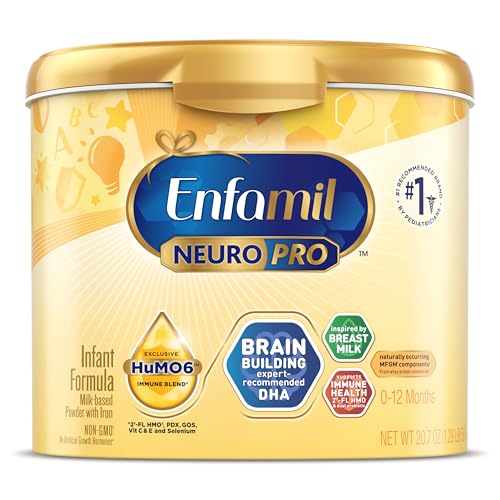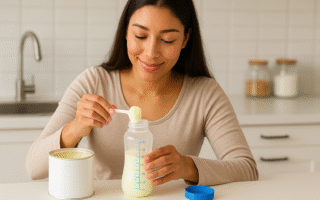Is Infant Formula Safe for Newborns? Welcoming a newborn is a life-changing experience filled with love, responsibility, and a lot of questions—especially about feeding. One of the most common concerns new parents have is whether infant formula is truly safe for their newborn.
This post offers a compassionate and evidence-based guide to help you make an informed decision.
What Is Infant Formula and How Is It Made?
Infant formula is a specially designed food product that aims to mimic the nutritional profile of breast milk as closely as possible. It is typically made from cow’s milk that has been modified to be digestible and nutritionally suitable for babies. There are also formulas made from soy, hydrolyzed protein, or specialized ingredients for infants with allergies or sensitivities.
Key Components of Infant Formula
- Proteins: Altered to be more digestible than regular cow’s milk.
- Fats: Often include vegetable oils and essential fatty acids like DHA and ARA.
- Carbohydrates: Usually lactose or other digestible sugars.
- Vitamins and Minerals: Added to meet the nutritional needs of newborns.
- Optional Additives: Some formulas include prebiotics, probiotics, or nucleotides to support gut health and immunity.
Is Infant Formula Safe for Newborns?
Yes, infant formula is considered safe for newborns when prepared and used correctly. All formulas sold in the United States must meet strict safety and nutritional standards set by the U.S. Food and Drug Administration (FDA). These regulations ensure that formulas support normal growth and development (FDA, 2023).
Common Safety Concerns
- Contamination: Always check expiration dates and packaging integrity. Prepare formula with sterilized equipment and safe water.
- Allergies and Intolerances: Some babies may have cow’s milk protein allergy or lactose intolerance. In these cases, your pediatrician might recommend a hypoallergenic or lactose-free formula.
- Preparation Errors: Always follow the manufacturer’s mixing instructions. Too much powder or water can lead to nutrient imbalances or dehydration.
How Does Infant Formula Compare to Breast Milk?
Breast milk is often referred to as the “gold standard” for infant nutrition because of its natural antibodies, enzymes, and ideal nutrient composition. However, infant formula is a reliable and nutritious alternative.
Pros of Breast Milk
- Contains antibodies that help protect against infections.
- Easily digestible.
- Naturally adapts to the baby’s changing needs.
Pros of Infant Formula
- Convenient and can be prepared in advance.
- Allows others (partners, caregivers) to help with feeding.
- Nutritionally complete for babies who cannot be breastfed.
What Experts Say
According to the American Academy of Pediatrics (AAP), while breastfeeding is recommended for at least the first six months, infant formula is a safe and healthy alternative when breastfeeding isn’t possible or chosen (AAP, 2022).
When Should You Consider Using Infant Formula?
Choosing to use formula is a personal decision, and there are many reasons a parent might opt for it:
- Low Milk Supply: Some mothers struggle to produce enough milk.
- Medical Conditions: Certain conditions (e.g., HIV, active tuberculosis) may make breastfeeding unsafe.
- Return to Work: Formula can help manage feeding when a parent returns to work.
- Baby’s Weight Gain: Supplementing with formula can help if a baby is not gaining enough weight through breastfeeding alone.
It’s Okay to Combine Feeding Methods
Many parents choose a combination of breastfeeding and formula-feeding, known as mixed feeding. This approach can help meet both the baby’s needs and the family’s lifestyle.
What Should You Look for in a Safe Infant Formula?
Not all formulas are the same. When choosing a formula, consider your baby’s specific health needs and talk with your pediatrician.
Key Factors to Evaluate
- FDA Approval: Make sure the formula is FDA-regulated.
- Age Appropriateness: Use formula intended for newborns (usually labeled “Stage 1”).
- Type of Formula:
- Cow’s Milk-Based: Most common and well-tolerated.
- Soy-Based: Suitable for lactose intolerance or milk allergy.
- Hydrolyzed: Protein is broken down for easier digestion.
- Added Nutrients: Look for DHA, ARA, iron, and probiotics if recommended by your pediatrician.
How Can You Prepare and Store Infant Formula Safely?
Safe preparation is just as important as the formula you choose.
Preparation Tips
- Wash hands before preparing bottles.
- Sterilize bottles, nipples, and mixing utensils.
- Use clean, safe water—boiled if necessary and cooled to room temperature.
- Follow the mixing instructions exactly.
Storage Tips
- Store prepared bottles in the refrigerator and use within 24 hours.
- Discard leftover formula from a feeding.
- Avoid microwaving bottles, as it can create hot spots that burn your baby’s mouth (Mayo Clinic, 2022).
Are There Any Risks Associated With Formula Feeding?
While infant formula is safe, it doesn’t provide the same immune-boosting properties as breast milk. Some studies have found that formula-fed babies may have a slightly higher risk of:
- Ear infections
- Respiratory illnesses
- Gastrointestinal infections
- Obesity later in life
However, these risks can be minimized with good hygiene, proper nutrition, and regular pediatric care (CDC, 2023).
What Does Science Say About Infant Formula Safety?
Numerous scientific studies and international organizations, including the World Health Organization (WHO) and the Centers for Disease Control and Prevention (CDC), agree that commercial infant formula is a safe option when breastfeeding is not possible or preferred.
Studies show that infants who are formula-fed grow and develop within normal ranges when formula is used properly (WHO, 2021).
When Should You Call a Doctor?
You should contact your pediatrician if:
- Your baby shows signs of an allergy (rash, vomiting, diarrhea, colic).
- You’re unsure how much formula to feed.
- Your baby has poor weight gain.
- You want to switch formula types.
Always trust your instincts. If something feels off, reach out to a healthcare provider.
Conclusion
Infant formula is a safe and nutritious option for feeding newborns. Whether you choose it due to medical reasons, lifestyle needs, or personal preference, know that you are still providing your baby with what they need to grow and thrive. Every family is different, and what matters most is making an informed, loving choice that works for you and your baby.
References
American Academy of Pediatrics. (2022). Choosing a formula. HealthyChildren.org. Retrieved from https://www.healthychildren.org/English/ages-stages/baby/formula-feeding/Pages/Choosing-a-Formula.aspx
Centers for Disease Control and Prevention. (2023). Infant formula feeding. CDC. Retrieved from https://www.cdc.gov/nutrition/infantandtoddlernutrition/formula-feeding/index.html
Mayo Clinic. (2022). Formula feeding FAQs: Safety and storage. Mayo Foundation for Medical Education and Research. Retrieved from https://www.mayoclinic.org/healthy-lifestyle/infant-and-toddler-health/in-depth/formula-feeding/art-20046246
U.S. Food and Drug Administration. (2023). Infant formula: Safety and nutritional standards. FDA. Retrieved from https://www.fda.gov/food/people-risk-foodborne-illness/infant-formula-guidance-documents-regulatory-information
World Health Organization. (2021). Infant and young child feeding. WHO Fact Sheet. Retrieved from https://www.who.int/news-room/fact-sheets/detail/infant-and-young-child-feeding
I’m Cris Coelho, and motherhood has transformed my life!
As a speech therapist and early childhood educator, I’ve always been passionate about child development. But it was becoming a mother that truly opened my eyes to the real challenges and joys of this journey.
Here at Materníssima, I share everything I’ve learned — blending professional knowledge, real-life experience, and a heartfelt touch.
You’re very welcome here! 💕






